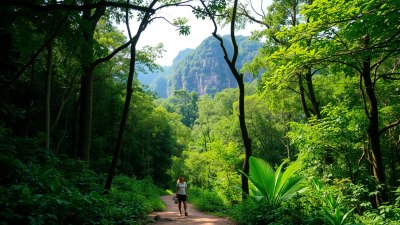How to Sleep on Vacation Without Waking Up at 6 AM Every Day
Discover tips for sleeping peacefully on vacation and avoiding early wake-ups.

Vacations are meant to be a time of relaxation and enjoyment, yet many travelers find themselves waking up at the crack of dawn, often due to changes in time zones, excitement, or even anxiety about missing out on activities. If you are struggling with early wake-ups while on vacation, you are not alone. Fortunately, there are effective strategies that can help you maintain a restful sleep schedule and fully enjoy your time away. In this article, we will explore several techniques that will allow you to sleep soundly on vacation, ensuring you can rise and shine at your preferred hour.
Understanding Your Sleep Cycle
To tackle the issue of waking up too early, it is essential first to understand your sleep cycle. A typical sleep cycle lasts about 90 minutes and includes multiple stages: light sleep, deep sleep, and REM sleep. Disruptions in these stages can lead to waking up earlier than desired. While on vacation, factors like new environments, noise, or changes in your routine can all affect these sleep stages. Ensuring quality sleep is vital, so pay attention to how factors such as light and sound can impact your rest.
Adjust Your Sleep Schedule Gradually
As your vacation approaches, consider adjusting your sleep schedule a few days in advance. If you are traveling to a different time zone, try to shift your bedtime and wake-up time closer to the destination's times. Gradually adjusting can help your body adapt to the new time, reducing the chance of waking up early upon arrival. For those with flexible schedules, consider going to bed and waking up earlier or later in 20-30 minute increments.
Create a Comforting Sleep Environment
Your sleep environment plays a significant role in the quality of your rest. When staying in a hotel, vacation rental, or even your own home, make your sleep environment as conducive to rest as possible. Keep the room dark by closing curtains or using eye masks, maintain a cool temperature, and eliminate noise interference with earplugs or white noise machines. Bringing familiar items like a favorite pillow or blanket can also create a comforting atmosphere that promotes better sleep.
Limit Caffeine and Alcohol Intake
While it may be tempting to enjoy coffee or cocktails throughout the day, both caffeine and alcohol can interfere with sleep quality. Caffeine can keep you awake longer than desired, and although alcohol may help you fall asleep faster, it can disrupt deep sleep and lead to early awakenings. Aim to limit these substances, especially in the hours leading up to bedtime. Opt for herbal teas or other non-caffeinated beverages in the afternoons and evenings.
Establish a Relaxation Routine
Before bed, your mind and body should transition into a state of relaxation. Create a calming pre-sleep routine to signal to your body that it is time for rest. Activities such as reading, taking a warm bath, practicing deep breathing exercises, or meditating can ease your mind and help you wind down. Avoid stimulating activities like browsing your phone or watching TV, as these can heighten your alertness and make it harder for you to sleep.
Engage in Physical Activity
Incorporating physical activity into your daily routine, especially while on vacation, can help regulate your sleep pattern. Exercise promotes the release of endorphins, which can enhance mood and reduce stress—both of which can contribute to better sleep. However, try to avoid vigorous workouts close to bedtime, as they can have the opposite effect. Aim for moderate exercise earlier in the day, such as walking or biking, to ensure a good night's sleep.
Limit Naps
Napping during the day can be a double-edged sword. While short naps can be beneficial, lengthy or poorly timed naps can interfere with nighttime sleep. If you find yourself feeling tired and want to nap, aim for a short power nap of no more than 20-30 minutes in the early afternoon. This approach allows you to recharge without sabotaging your ability to fall asleep at night.
Be Mindful of Your Diet
Your diet can also influence your sleep patterns. Consuming heavy meals close to bedtime can lead to discomfort and restlessness. Try to have your last meal a few hours before bed. Including sleep-friendly foods such as almonds, turkey, and bananas in your diet can promote better sleep quality, thanks to their serotonin and melatonin content that aid sleep regulation.
Stay Hydrated, But Not Too Much
Staying hydrated is essential, especially when traveling in hot climates. However, avoid drinking large amounts of water right before bed to reduce the likelihood of waking up in the middle of the night to use the restroom. Balance your hydration throughout the day to keep your body happy without compromising your sleep.
Monitor Your Travel Stress
Travel can be stressful, and the anticipation of activities can lead to feelings of anxiety that disrupt sleep. To ease these feelings, practice mindfulness and stress-reducing techniques throughout your vacation. Journaling about experiences, practicing yoga, or taking moments for deep breathing can help mitigate the effects of stress on your sleep.
Utilize Sleep Aids Wisely
If you find it challenging to fall asleep in unfamiliar settings, consider natural sleep aids to help you wind down. Melatonin supplements can be used to adjust your internal clock, especially for those crossing several time zones. However, consult with a healthcare professional before taking any new supplements, as they offer tailored advice based on your specific needs.
Communicate with Travel Companions
If you are traveling with others, communicate your sleep needs clearly. Discussing your desired wake-up times and nightly routines can help establish a group understanding of each person's needs. Opting for accommodations that offer privacy, like separate rooms, can also ensure you have the quiet environment necessary for restful sleep.
Plan Your Itinerary Wisely
In the excitement of vacation, you may be tempted to cram your schedule with activities. However, a packed itinerary can lead to exhaustion and fatigue, making it challenging to attain quality sleep. Plan your activities with a balance in mind, allowing for downtime and relaxation. This approach not only helps you enjoy each experience but also creates space for adequate rest.
Conclusion
With careful planning and consideration, avoiding early wake-ups while on vacation is entirely achievable. By understanding your sleep cycle, creating a conducive sleep environment, managing your intake of caffeine and alcohol, and implementing a calming routine, you can successfully regulate your sleep patterns. Remember to focus on activities that promote relaxation, stay mindful of your diet, and communicate your sleep needs with others. Use these strategies to reclaim your vacation rest, allowing you to wake up refreshed and ready for adventure at your desired time.











